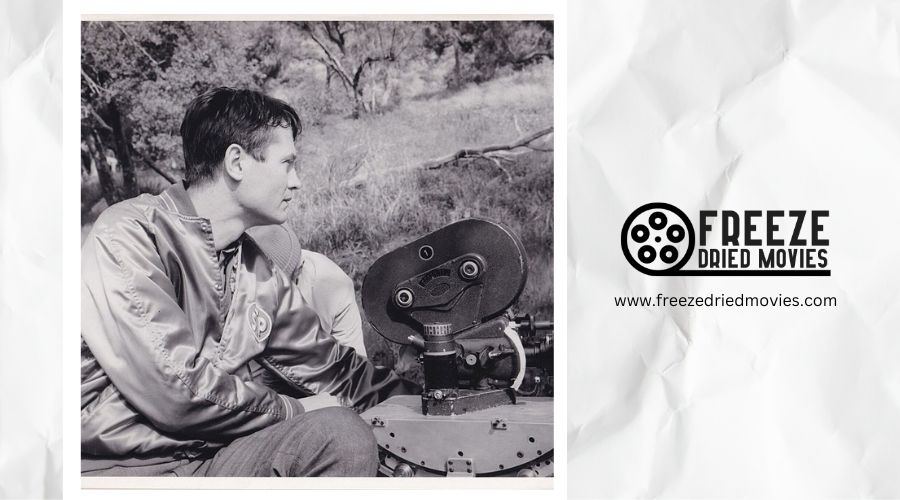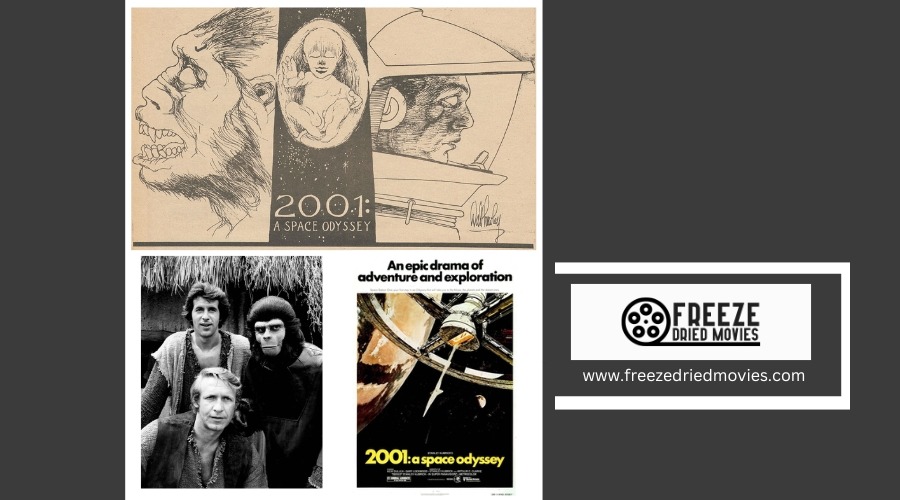Roger Corman: The Master of Low-Budget 1960s Cinema

You'll find Roger Corman's genius in his ability to create profitable B-movies on minimal budgets throughout the 1960s. His innovative filmmaking launched the careers of Francis Ford Coppola, Martin Scorsese, and Jack Nicholson while producing cult classics like "The Little Shop of Horrors" and his Edgar Allan Poe cycle starring Vincent Price. Through his hands-off mentorship and cost-effective production methods, Corman established a blueprint for independent cinema that continues to influence filmmakers today.
The Rise of a B-Movie Visionary
While Hollywood's mainstream studios focused on big-budget spectacles in the 1960s, Roger Corman carved out his own unique path by commanding the art of low-budget filmmaking. You'll find his genius in classics like A Bucket of Blood and The Little Shop of Horrors, which he shot for just $35,000 in two days, proving that creativity trumps costly production values.
Corman's innovative approach to producing low-budget black-and-white films didn't just entertain audiences; it launched the careers of New Hollywood's greatest directors. He gave first chances to Martin Scorsese, Francis Ford Coppola, and Ron Howard, altering them from unknowns into industry legends. Among his protégés, Coppola went on to create The Godfather trilogy, which would earn him numerous Academy Awards and establish him as one of cinema's greatest filmmakers. By producing over 300 films and directing 50 himself, Corman showed that engaging storytelling doesn't need a massive budget. His legacy lives on through Concorde-New Horizons, where he continued nurturing fresh talent and independent filmmaking.
Breaking Ground With the Little Shop of Horrors
When Roger Corman filmed The Little Shop of Horrors in 1960, he demonstrated the true power of resourceful filmmaking. With just $35,000 and two days to shoot, he created a cult classic that would help launch careers, including a young Jack Nicholson's. You'll find that this film perfectly encapsulates Corman's genius for maximizing limited resources while providing engaging entertainment.
- Shot on a recycled set to minimize costs
- Launched future talents like Jack Nicholson, paving the way for others like Francis Ford Coppola
- Proved that compelling storytelling doesn't require big budgets
- Established Corman's reputation as a mentor for emerging filmmakers
The Little Shop of Horrors became more than just another B-movie; it represented Corman's blueprint for independent filmmaking success. His practical approach revolutionized low-budget productions and influenced generations of independent filmmakers. The film's successful blend of dark humor with horror established a winning formula that Corman would continue to employ throughout his career.

The Edgar Allan Poe Film Cycle
Fresh off the success of The Little Shop of Horrors, Roger Corman commenced on his most ambitious project yet: adapting Edgar Allan Poe's gothic tales for the silver screen. Starting with The Fall of the House of Usher in 1960, he'd go on to direct eight atmospheric adaptations that showcased his ability to create maximum impact on minimal budgets.
You'll find the magic of these Poe films lies in their versatility, ranging from psychological horror to dark comedy. With Vincent Price starring in seven of the eight features, including standouts like The Masque of the Red Death, Corman crafted a series that expertly balanced artistic vision with commercial appeal. Through innovative camera work and clever production design, he converted budget constraints into opportunities for creativity, establishing himself as a pioneer of efficient filmmaking while influencing a generation of future directors. Working with Richard Matheson's screenplays, Corman successfully translated Poe's Gothic atmospheres into compelling visual narratives that resonated with audiences.
Mentoring Hollywood's Future Icons
Among Roger Corman's most enduring contributions to cinema lies his exceptional eye for talent and willingness to mentor aspiring filmmakers. You'll find his impact most evident in the careers of two legendary directors: Francis Ford Coppola and Martin Scorsese, who both got their start working on Corman films.
His hands-off approach to mentoring Hollywood's future icons gave young directors creative freedom while teaching them the essentials of efficient filmmaking.
Francis Ford Coppola, Jonathan Demme, and Joe Dante made their directorial debuts in films produced by Corman. Future stars like Jack Nicholson and Peter Fonda found early career breakthroughs under his guidance. His production company served as an unofficial film school for emerging talent. Corman's trust in young filmmakers' vision helped shape the New Hollywood movement of the 1970s.
The Birth of New World Pictures
The entrepreneurial spirit of Roger Corman reached new heights in 1970 with the launch of New World Images, a pioneering independent production company that would reshape low-budget filmmaking.
Pioneering Independent Film Distribution
Building upon his success with New World Pictures, Roger Corman revolutionized independent film distribution when he established Concorde-New Horizons in 1983.
You'll find that unlike his early days with American International Pictures, Corman's new venture gave him complete control over both production and distribution. His innovative approach plunged the B-movie genre and created lasting changes in the independent film industry.
- Direct distribution channels that bypassed traditional Hollywood gatekeepers
- Cost-effective production methods that maximized return on investment
- Launch platform for emerging filmmakers and talent
- Diverse portfolio of genre films targeting specific audience segments
Through Concorde-New Horizons, Corman's distribution model proved that you didn't need big studio backing to reach audiences. He created a sustainable system that supported low-budget filmmaking while nurturing new talent, demonstrating that independent cinema could be both profitable and creatively fulfilling.

Creating the Corman Formula
Roger Corman's legendary status in independent cinema stems from a distinctive production approach that would become known as "The Corman Formula." While his distribution methods broke new ground, it was his practical filmmaking philosophy that truly set him apart.
You'll find the essence of his formula in cult classics like Little Shop of Horrors and A Bucket of Blood, where he maximized limited resources through quick shooting schedules and creative storytelling. As Corman produced over 300 films, he perfected the art of making commercially viable movies on shoestring budgets. He'd often uncover and nurture emerging talent, transforming unknown actors and filmmakers into industry powerhouses.
This approach didn't just save money - it created a vibrant environment where innovation thrived. His success proved that captivating narratives could overcome financial constraints, revolutionizing independent filmmaking forever.
From Drive-Ins to Cult Classics
During the 1960s, Corman's films found their perfect audience at America's drive-in theaters, where his low-budget productions became cultural touchstones for a generation of moviegoers.
You'll find his adaptations of Edgar Allan Poe, including House of Usher, featuring horror legend Boris Karloff, transformed drive-in fare into lasting cult classics.
His most exceptional achievement, The Little Shop of Horrors, was famously shot in just two days for $35,000, proving you don't need a massive budget to create enduring cinema.
- Excelled at the art of quick, efficient filmmaking without sacrificing entertainment value
- Created atmospheric horror adaptations that elevated B-movie standards
- Turned drive-in entertainment into legitimate cult classics
- Proved that creativity and resourcefulness could overcome budget limitations
These innovations helped establish Corman's reputation as a visionary who could transform minimal resources into maximum impact.
The Legacy of Roger Corman's Film School
A legendary incubator of talent emerged from Corman's unique approach to filmmaking, as he converted his low-budget productions into an unofficial film school for future Hollywood giants. His mentorship launched the careers of directors like Martin Scorsese, Francis Ford Coppola, Ron Howard, and Peter Bogdanovich, giving them their first shots at directing feature films.
His generous spirit and willingness to give creative freedom on small-scale projects helped shape the modern independent film movement. Rather than viewing these emerging talents as competition, he welcomed their potential and provided them with meaningful hands-on experience that would define their future success in Hollywood.
A Blueprint for Modern Independent Cinema
Throughout the evolution of independent cinema, Corman's resourceful production methods have served as an enduring blueprint for aspiring filmmakers. You'll find his influence in countless modern productions, from Wild Angels to Boxcar Bertha, where efficient storytelling trumps lavish budgets. His approach has inspired directors like Joe Dante and continues to shape contemporary indie filmmaking through films like Caged Heat.
- Creating engaging narratives with minimal resources
- Prioritizing story development over expensive special effects
- Identifying and nurturing emerging talent in the industry
- Maintaining profitable production through genre diversity
Corman's Concorde-New Horizons production company proved that independent films could be both commercially successful and artistically meaningful. Today's filmmakers continue to follow his model, demonstrating that you don't need vast resources to create captivating cinema that resonates with audiences.




